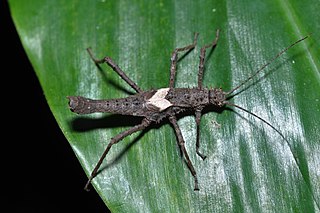
Pylaemenes is a genus of stick insects in the family Heteropterygidae and subfamily Dataminae. It combines small to medium-sized, often brightly colored Phasmatodea species. Their representatives are found in large parts of Southeast Asia.

The genus Orestes combines relatively small and elongated Phasmatodea species from Southeast and East Asia.

Orestes draegeri is a species of stick insects in the subfamily Dataminae and tribe Datamini.

Datamini is the only tribe within the subfamily of the Dataminae from the order of the Phasmatodea. The representatives of this subfamily are on average not as large as those of the other two subfamilies belonging to the family of Heteropterygidae.

The genus Dares, which is mainly native to Borneo, combines relatively small and mostly dark-colored Phasmatodea species.

The genus Planispectrum combines very small and compact species from Southeast Asia.

Orestes dittmari is a species of stick insects in the subfamily Dataminae.

Orestes mouhotii is an insect species belonging to the order of Phasmatodea. Because of its synyonym Orestes verruculatus, it is the type species of the genus Orestes. Because of its compact body shape, the species is sometimes referred to as small cigar stick insect.

Orestes bachmaensis is a Phasmatodea species native to central Vietnam.

Orestes guangxiensis is a representative of the genus Orestes.

Orestes japonicus, a stick insect, is a representative of the genus Orestes.

Orestes krijnsi is a species of stick insects native to Vietnam.

Orestes subcylindricus is a species of stick insects native to Vietnam.

Orestes shirakii is a species of stick insects native to Taiwan.
Pylaemenes konkakinhensis is a species of stick insects native in Vietnam. The species is so far only known from a single female.
Orestes diabolicus is a species of stick insects native in Vietnam. The species is so far only known from a three males.
Orestes botot is a species of stick insects native in Vietnam.

Pylaemenes konchurangensis is a species of stick insects native in Vietnam. The species has been described in the genus Pylaemenes, but from its morphological characters it belongs in the genus Orestes.

Haaniella parva is a species of stick insect from the subfamily Heteropteryginae and belongs to the representatives of the genus Haaniella native to Sumatra. It is their smallest representative.

Pylaemenes sepilokensis is a species of stick insects (Phasmatodea) that is found in Borneo, more precisely in the Malay state of Sabah.



















